Exploring the Stigma Surrounding Mental Illness and Its Consequences
VerifiedAdded on 2022/09/15
|5
|1006
|21
Essay
AI Summary
This essay delves into the multifaceted issue of stigma and its profound impact on individuals grappling with mental illness. It meticulously examines the dual nature of stigma, encompassing both societal stigma, which stems from the misconceptions and prejudices of the general population, and self-stigma, the internalized discrimination individuals with mental health issues harbor towards themselves. The essay dissects the three pillars of stigma—stereotypes, prejudice, and discrimination—and explores their manifestation at emotional, cognitive, and behavioral levels. It highlights the external influences that can exacerbate or mitigate the effects of stigma, including family dynamics and media portrayals. Furthermore, it emphasizes the detrimental effects of stigma on treatment access and recovery, including social alienation, inadequate healthcare, and homelessness. Ultimately, the essay underscores the importance of addressing and dismantling stigma to facilitate recovery and improve the quality of life for those affected by mental illness.
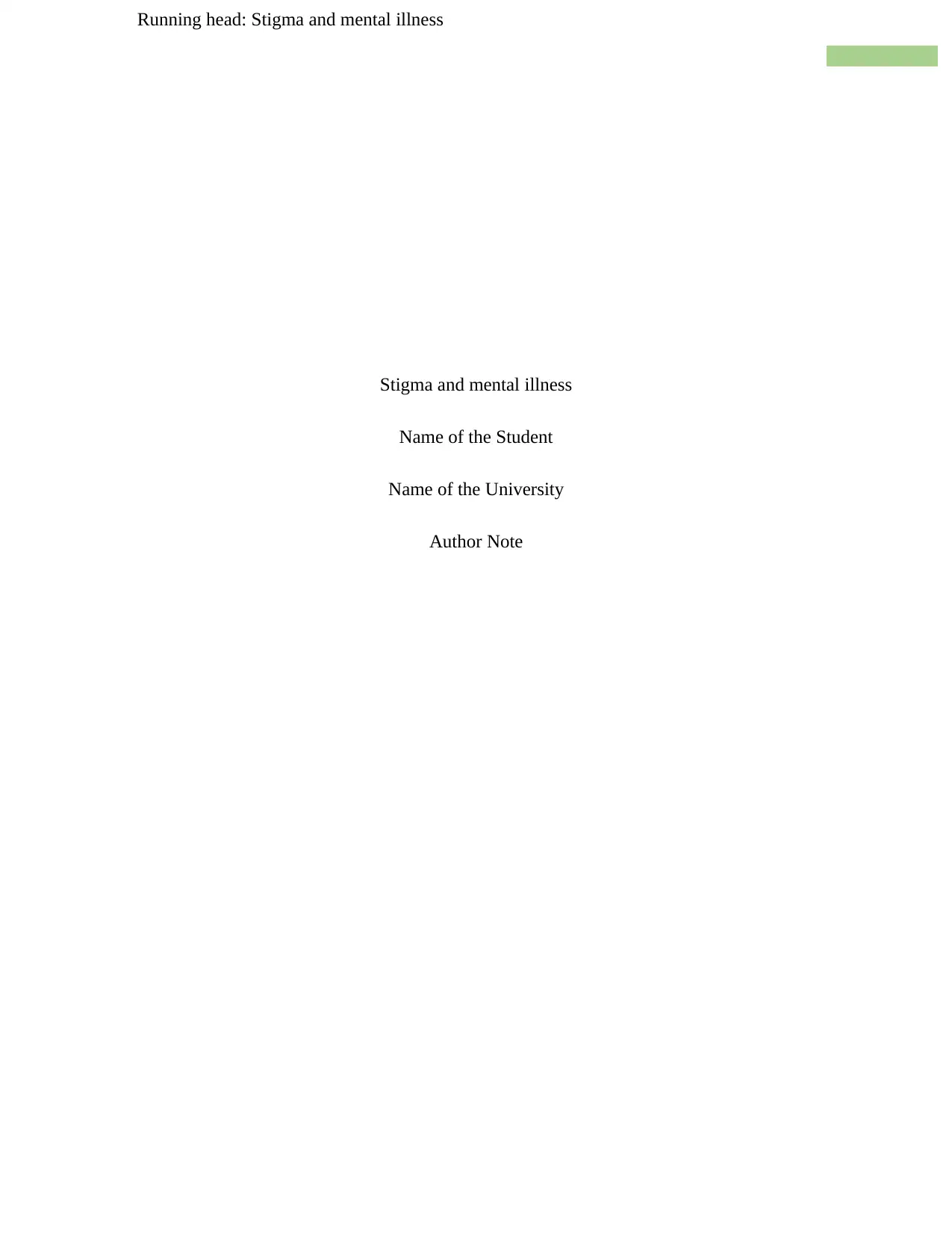
Running head: Stigma and mental illness
Stigma and mental illness
Name of the Student
Name of the University
Author Note
Stigma and mental illness
Name of the Student
Name of the University
Author Note
Paraphrase This Document
Need a fresh take? Get an instant paraphrase of this document with our AI Paraphraser
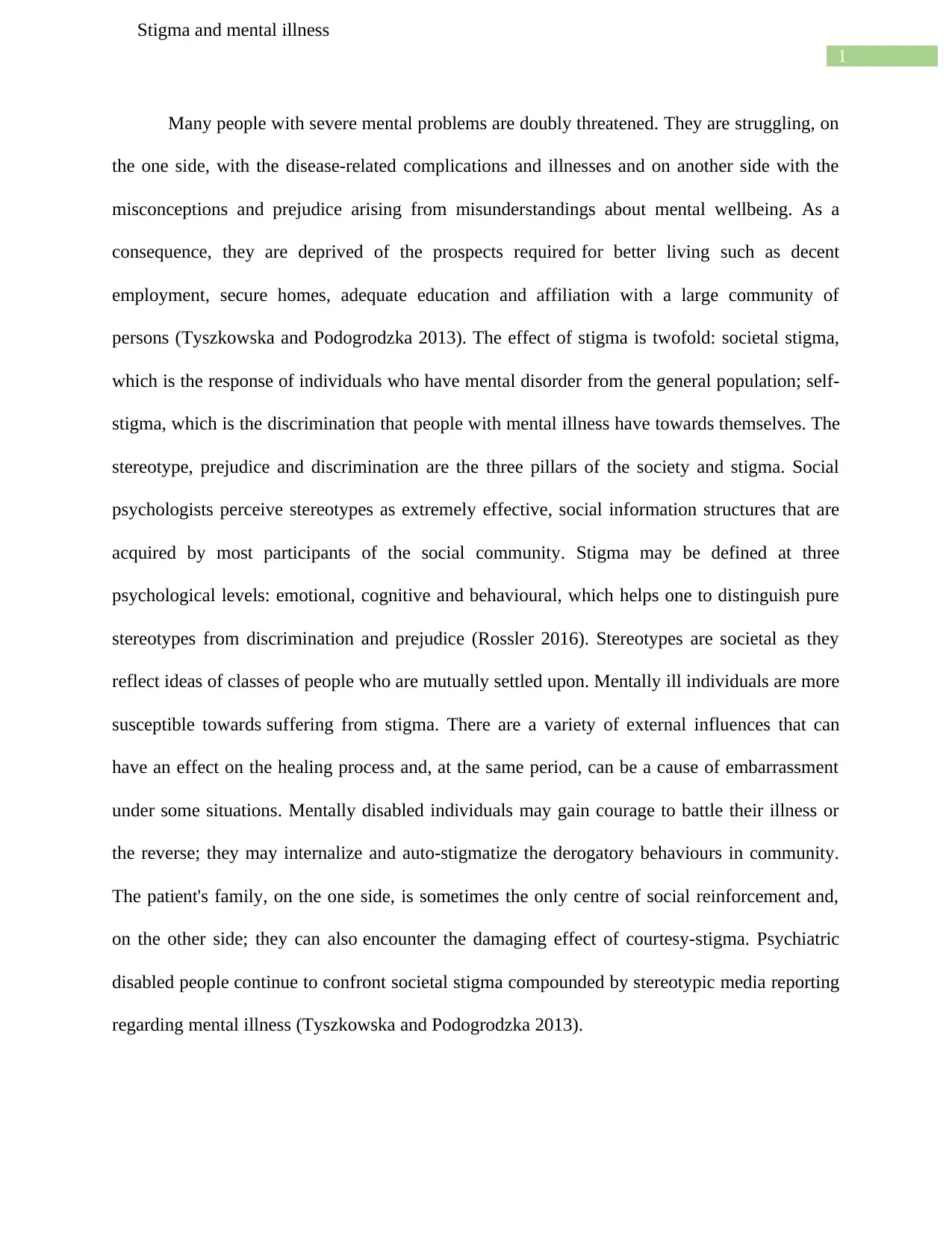
1
Stigma and mental illness
Many people with severe mental problems are doubly threatened. They are struggling, on
the one side, with the disease-related complications and illnesses and on another side with the
misconceptions and prejudice arising from misunderstandings about mental wellbeing. As a
consequence, they are deprived of the prospects required for better living such as decent
employment, secure homes, adequate education and affiliation with a large community of
persons (Tyszkowska and Podogrodzka 2013). The effect of stigma is twofold: societal stigma,
which is the response of individuals who have mental disorder from the general population; self-
stigma, which is the discrimination that people with mental illness have towards themselves. The
stereotype, prejudice and discrimination are the three pillars of the society and stigma. Social
psychologists perceive stereotypes as extremely effective, social information structures that are
acquired by most participants of the social community. Stigma may be defined at three
psychological levels: emotional, cognitive and behavioural, which helps one to distinguish pure
stereotypes from discrimination and prejudice (Rossler 2016). Stereotypes are societal as they
reflect ideas of classes of people who are mutually settled upon. Mentally ill individuals are more
susceptible towards suffering from stigma. There are a variety of external influences that can
have an effect on the healing process and, at the same period, can be a cause of embarrassment
under some situations. Mentally disabled individuals may gain courage to battle their illness or
the reverse; they may internalize and auto-stigmatize the derogatory behaviours in community.
The patient's family, on the one side, is sometimes the only centre of social reinforcement and,
on the other side; they can also encounter the damaging effect of courtesy-stigma. Psychiatric
disabled people continue to confront societal stigma compounded by stereotypic media reporting
regarding mental illness (Tyszkowska and Podogrodzka 2013).
Stigma and mental illness
Many people with severe mental problems are doubly threatened. They are struggling, on
the one side, with the disease-related complications and illnesses and on another side with the
misconceptions and prejudice arising from misunderstandings about mental wellbeing. As a
consequence, they are deprived of the prospects required for better living such as decent
employment, secure homes, adequate education and affiliation with a large community of
persons (Tyszkowska and Podogrodzka 2013). The effect of stigma is twofold: societal stigma,
which is the response of individuals who have mental disorder from the general population; self-
stigma, which is the discrimination that people with mental illness have towards themselves. The
stereotype, prejudice and discrimination are the three pillars of the society and stigma. Social
psychologists perceive stereotypes as extremely effective, social information structures that are
acquired by most participants of the social community. Stigma may be defined at three
psychological levels: emotional, cognitive and behavioural, which helps one to distinguish pure
stereotypes from discrimination and prejudice (Rossler 2016). Stereotypes are societal as they
reflect ideas of classes of people who are mutually settled upon. Mentally ill individuals are more
susceptible towards suffering from stigma. There are a variety of external influences that can
have an effect on the healing process and, at the same period, can be a cause of embarrassment
under some situations. Mentally disabled individuals may gain courage to battle their illness or
the reverse; they may internalize and auto-stigmatize the derogatory behaviours in community.
The patient's family, on the one side, is sometimes the only centre of social reinforcement and,
on the other side; they can also encounter the damaging effect of courtesy-stigma. Psychiatric
disabled people continue to confront societal stigma compounded by stereotypic media reporting
regarding mental illness (Tyszkowska and Podogrodzka 2013).
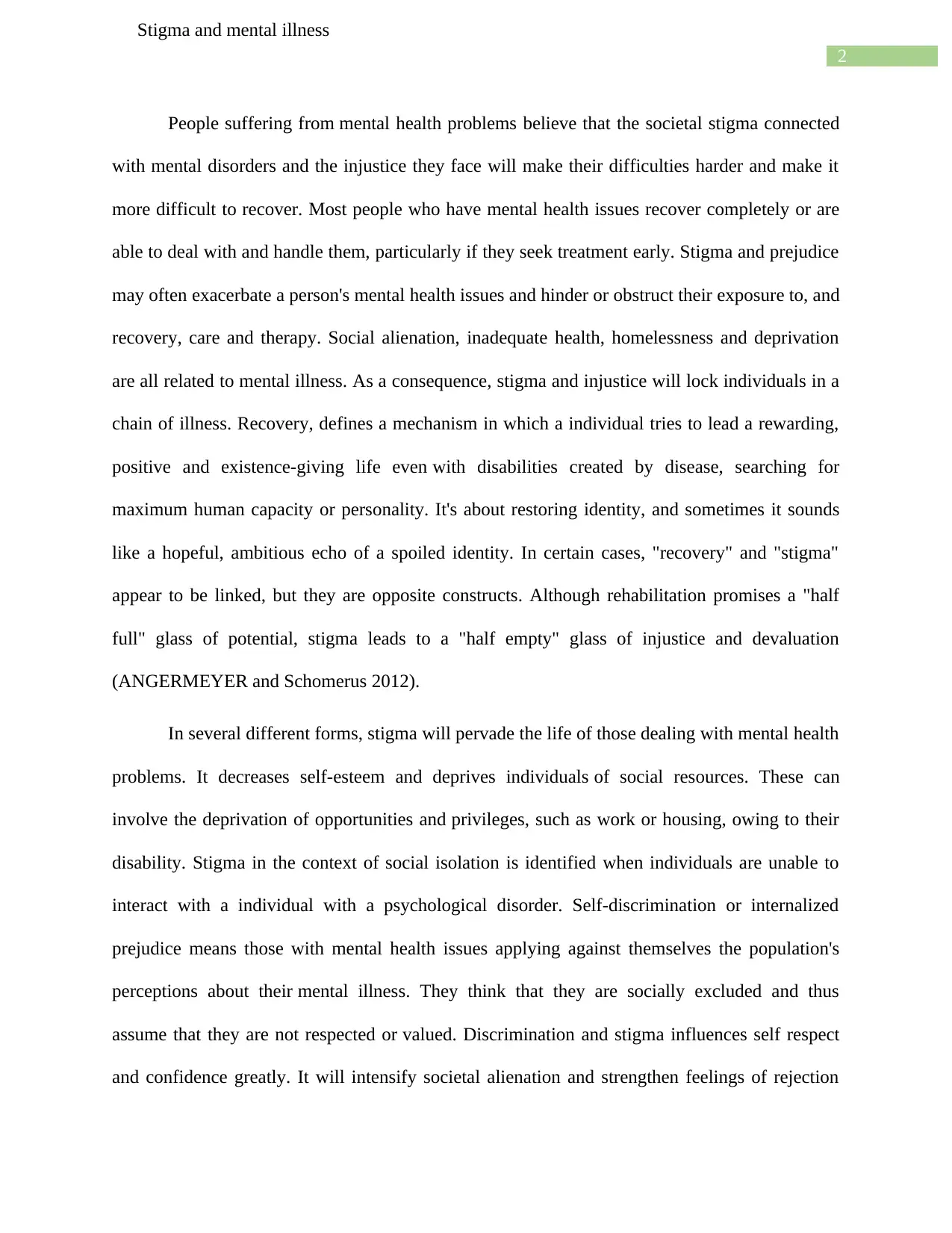
2
Stigma and mental illness
People suffering from mental health problems believe that the societal stigma connected
with mental disorders and the injustice they face will make their difficulties harder and make it
more difficult to recover. Most people who have mental health issues recover completely or are
able to deal with and handle them, particularly if they seek treatment early. Stigma and prejudice
may often exacerbate a person's mental health issues and hinder or obstruct their exposure to, and
recovery, care and therapy. Social alienation, inadequate health, homelessness and deprivation
are all related to mental illness. As a consequence, stigma and injustice will lock individuals in a
chain of illness. Recovery, defines a mechanism in which a individual tries to lead a rewarding,
positive and existence-giving life even with disabilities created by disease, searching for
maximum human capacity or personality. It's about restoring identity, and sometimes it sounds
like a hopeful, ambitious echo of a spoiled identity. In certain cases, "recovery" and "stigma"
appear to be linked, but they are opposite constructs. Although rehabilitation promises a "half
full" glass of potential, stigma leads to a "half empty" glass of injustice and devaluation
(ANGERMEYER and Schomerus 2012).
In several different forms, stigma will pervade the life of those dealing with mental health
problems. It decreases self-esteem and deprives individuals of social resources. These can
involve the deprivation of opportunities and privileges, such as work or housing, owing to their
disability. Stigma in the context of social isolation is identified when individuals are unable to
interact with a individual with a psychological disorder. Self-discrimination or internalized
prejudice means those with mental health issues applying against themselves the population's
perceptions about their mental illness. They think that they are socially excluded and thus
assume that they are not respected or valued. Discrimination and stigma influences self respect
and confidence greatly. It will intensify societal alienation and strengthen feelings of rejection
Stigma and mental illness
People suffering from mental health problems believe that the societal stigma connected
with mental disorders and the injustice they face will make their difficulties harder and make it
more difficult to recover. Most people who have mental health issues recover completely or are
able to deal with and handle them, particularly if they seek treatment early. Stigma and prejudice
may often exacerbate a person's mental health issues and hinder or obstruct their exposure to, and
recovery, care and therapy. Social alienation, inadequate health, homelessness and deprivation
are all related to mental illness. As a consequence, stigma and injustice will lock individuals in a
chain of illness. Recovery, defines a mechanism in which a individual tries to lead a rewarding,
positive and existence-giving life even with disabilities created by disease, searching for
maximum human capacity or personality. It's about restoring identity, and sometimes it sounds
like a hopeful, ambitious echo of a spoiled identity. In certain cases, "recovery" and "stigma"
appear to be linked, but they are opposite constructs. Although rehabilitation promises a "half
full" glass of potential, stigma leads to a "half empty" glass of injustice and devaluation
(ANGERMEYER and Schomerus 2012).
In several different forms, stigma will pervade the life of those dealing with mental health
problems. It decreases self-esteem and deprives individuals of social resources. These can
involve the deprivation of opportunities and privileges, such as work or housing, owing to their
disability. Stigma in the context of social isolation is identified when individuals are unable to
interact with a individual with a psychological disorder. Self-discrimination or internalized
prejudice means those with mental health issues applying against themselves the population's
perceptions about their mental illness. They think that they are socially excluded and thus
assume that they are not respected or valued. Discrimination and stigma influences self respect
and confidence greatly. It will intensify societal alienation and strengthen feelings of rejection
⊘ This is a preview!⊘
Do you want full access?
Subscribe today to unlock all pages.

Trusted by 1+ million students worldwide
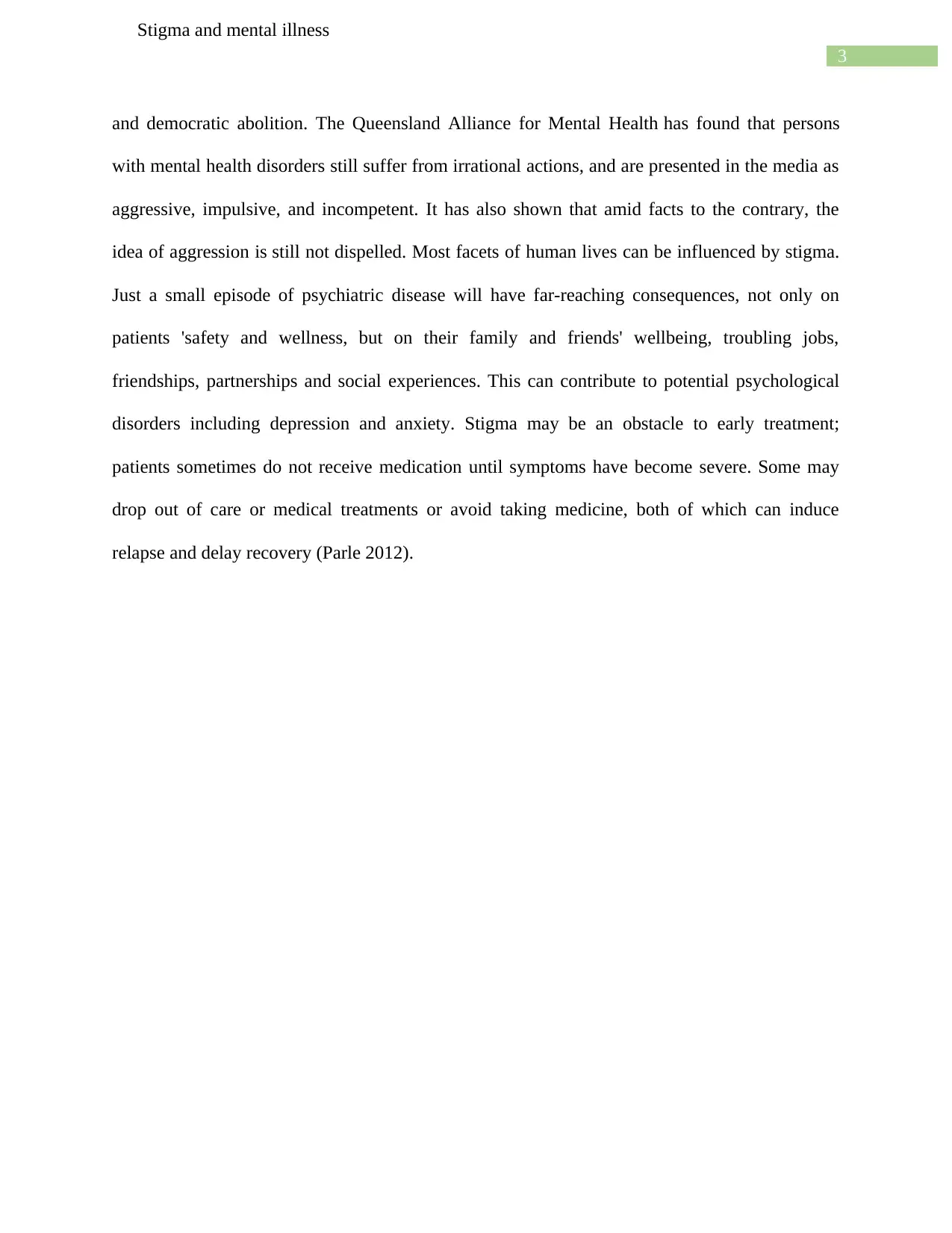
3
Stigma and mental illness
and democratic abolition. The Queensland Alliance for Mental Health has found that persons
with mental health disorders still suffer from irrational actions, and are presented in the media as
aggressive, impulsive, and incompetent. It has also shown that amid facts to the contrary, the
idea of aggression is still not dispelled. Most facets of human lives can be influenced by stigma.
Just a small episode of psychiatric disease will have far-reaching consequences, not only on
patients 'safety and wellness, but on their family and friends' wellbeing, troubling jobs,
friendships, partnerships and social experiences. This can contribute to potential psychological
disorders including depression and anxiety. Stigma may be an obstacle to early treatment;
patients sometimes do not receive medication until symptoms have become severe. Some may
drop out of care or medical treatments or avoid taking medicine, both of which can induce
relapse and delay recovery (Parle 2012).
Stigma and mental illness
and democratic abolition. The Queensland Alliance for Mental Health has found that persons
with mental health disorders still suffer from irrational actions, and are presented in the media as
aggressive, impulsive, and incompetent. It has also shown that amid facts to the contrary, the
idea of aggression is still not dispelled. Most facets of human lives can be influenced by stigma.
Just a small episode of psychiatric disease will have far-reaching consequences, not only on
patients 'safety and wellness, but on their family and friends' wellbeing, troubling jobs,
friendships, partnerships and social experiences. This can contribute to potential psychological
disorders including depression and anxiety. Stigma may be an obstacle to early treatment;
patients sometimes do not receive medication until symptoms have become severe. Some may
drop out of care or medical treatments or avoid taking medicine, both of which can induce
relapse and delay recovery (Parle 2012).
Paraphrase This Document
Need a fresh take? Get an instant paraphrase of this document with our AI Paraphraser
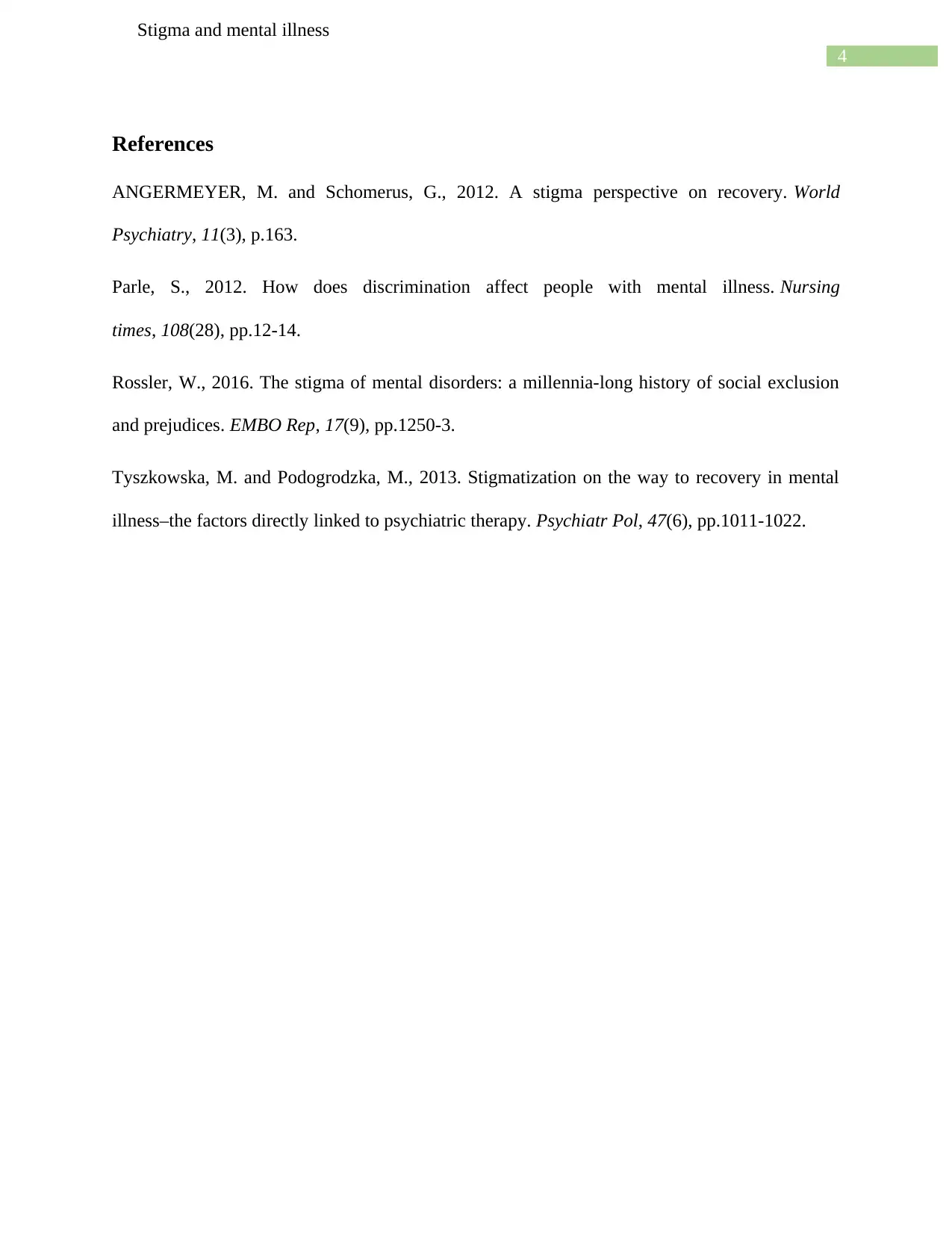
4
Stigma and mental illness
References
ANGERMEYER, M. and Schomerus, G., 2012. A stigma perspective on recovery. World
Psychiatry, 11(3), p.163.
Parle, S., 2012. How does discrimination affect people with mental illness. Nursing
times, 108(28), pp.12-14.
Rossler, W., 2016. The stigma of mental disorders: a millennia-long history of social exclusion
and prejudices. EMBO Rep, 17(9), pp.1250-3.
Tyszkowska, M. and Podogrodzka, M., 2013. Stigmatization on the way to recovery in mental
illness–the factors directly linked to psychiatric therapy. Psychiatr Pol, 47(6), pp.1011-1022.
Stigma and mental illness
References
ANGERMEYER, M. and Schomerus, G., 2012. A stigma perspective on recovery. World
Psychiatry, 11(3), p.163.
Parle, S., 2012. How does discrimination affect people with mental illness. Nursing
times, 108(28), pp.12-14.
Rossler, W., 2016. The stigma of mental disorders: a millennia-long history of social exclusion
and prejudices. EMBO Rep, 17(9), pp.1250-3.
Tyszkowska, M. and Podogrodzka, M., 2013. Stigmatization on the way to recovery in mental
illness–the factors directly linked to psychiatric therapy. Psychiatr Pol, 47(6), pp.1011-1022.
1 out of 5
Related Documents
Your All-in-One AI-Powered Toolkit for Academic Success.
+13062052269
info@desklib.com
Available 24*7 on WhatsApp / Email
![[object Object]](/_next/static/media/star-bottom.7253800d.svg)
Unlock your academic potential
Copyright © 2020–2026 A2Z Services. All Rights Reserved. Developed and managed by ZUCOL.





